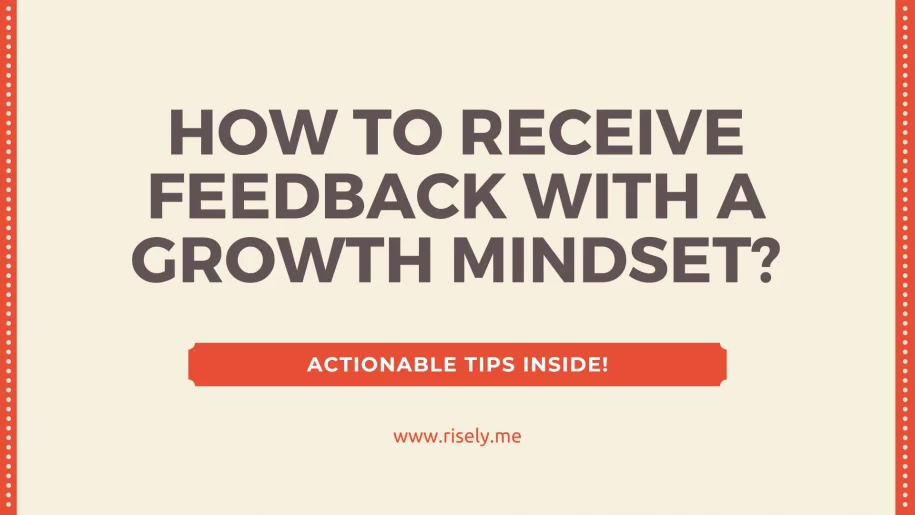How To Receive Feedback With A Growth Mindset?
Receiving feedback is an essential part of personal and professional growth. But let’s be honest. We frequently struggle to accept feedback and view it as criticism rather than an opportunity for improvement. To truly benefit from feedback, it is crucial to develop a growth mindset. A growth mindset is the belief that our abilities and talents can be improved through hard work, dedication, and the willingness to learn from others. In this blog, we will explore how to receive feedback with a growth mindset and how you can use it as a catalyst for personal and professional development.How does a growth mindset enhance feedback?
Feedback, when seen through the lens of a growth mindset, is not a judgment but a learning opportunity. It’s a chance to gain valuable insights and improve, rather than a reflection of one’s worth. Constructive feedback, in particular, is a powerful tool for your growth. It provides the stepping stones to enhance skills and reach one’s full potential. By adopting a growth mindset, you can transform feedback from a potential threat to a valuable resource for continuous learning, development, and goal achievement.💡 What’s a growth mindset?
A growth mindset, coined by Carol Dweck, is the belief that one’s abilities and talents can be developed through effort, perseverance, and the willingness to learn from setbacks. This mindset is essential for your academic achievement, professional development, and personal growth. Individuals with a growth mindset are more likely to embrace challenges, seek out feedback, and view failures as opportunities for learning and improvement.How to receive feedback with a growth mindset? Let’s see an example
Picture this: An employee named Alex has missed several project deadlines, which has impacted your team’s overall productivity. As a result, Alex receives the following feedback: “Alex, I’d like to discuss our recent project deadlines. We’ve noticed that in the last month, you missed the deadlines for the marketing report and the client proposal by a few days each time. When these deadlines are missed, it affects the entire team’s workflow and delays our ability to move forward with other tasks. For example, the marketing team had to postpone their campaign launch, and the client proposal had to be expedited, which added extra stress to the team. I know you’re capable of delivering high-quality work, and I believe we can avoid these issues with a bit more time management and prioritization. How about we work together to set intermediate milestones for your projects? Additionally, if you’re facing any challenges or need support with managing your workload, please let me know. I’m here to help, whether it’s through additional resources, time management tools, or simply talking through your tasks to prioritize better.” In this scenario, we can note that the feedback is provided pretty efficiently. The manager shared their observations, supported them with examples, and moved on to suggestions and support. Based on Alex’s mindset, there can be two very different reactions. First, let’s see how a fixed mindset receiving feedback works: If Alex works with a fixed mindset, they might react defensively to constructive feedback, viewing it as a personal criticism rather than an opportunity for growth. Their responses might exhibit:- Denial or Defensiveness: “I don’t think missing a couple of deadlines is such a big deal. Besides, other people have missed deadlines, and no one pointed it out.”
- Blaming External Factors: “It’s not my fault that the marketing report was late. I was waiting for data from another department, and they didn’t get it to me on time.”
- Feeling Threatened or Discouraged: “I always get picked on for things like this. Maybe I’m just not good enough for this role.”
- Acknowledging the Issue: “Thank you for pointing that out. I didn’t realize that my missed deadlines were having such an impact on the team.”
- Taking Responsibility: “I understand that I need to manage my time better to meet deadlines consistently.”
- Showing Willingness to Improve: “I think setting intermediate milestones is a great idea. It will help me stay on track and address any issues early on.”
- Seeking Feedback and Support: “Can you help me identify some tools or strategies for better time management? I want to make sure I’m improving in this area.”
Why do we react negatively to feedback?
Receiving feedback can often trigger strong emotional reactions, such as defensiveness or frustration. But why?- Feedback, especially if it is critical, can feel like a personal attack, threatening our self-worth and self-esteem. Negative feedback can trigger a fear of failure, making us feel inadequate or incapable.
- Critical feedback challenges a fixed belief and suggests that you need to change, which can be unsettling.
- Poorly delivered feedback, lack of clarity, or miscommunication can lead to misunderstandings about the intent or content of the feedback.
- Past negative experiences with feedback can lead to a conditioned response to react negatively to new feedback. You might have received bad feedback, or personal criticism disguised as feedback earlier.
How to receive feedback with a growth mindset?
By developing a growth mindset, you can shift perspectives and view feedback as an opportunity for growth and development, regardless of whether it is positive or negative.Navigating Initial Reactions to Feedback
Understanding the impact of emotions on feedback reception is crucial for developing a growth mindset and leveraging feedback for personal and professional development. Emotional responses to feedback can vary from person to person. Some may feel defensive or hurt, while others may become motivated to improve. You need to recognize these emotional responses and their impact on how you handle feedback. Difficult feedback, in particular, can trigger negative emotions, but by acknowledging and processing these emotions, you can maintain a receptive attitude and use the feedback as an opportunity for growth. Read more: 5 Ways To Master Emotional Management At Work For ManagersHow to Maintain a Positive Attitude Towards Feedback?
Maintaining a positive attitude towards feedback with a growth mindset is essential for receiving it. Here are some strategies to help you maintain a positive attitude:- Practice active listening: Pay attention to the feedback giver and actively listen to fully understand their perspectives.
- Seek specific examples: Ask for specific examples to gain a deeper understanding of the feedback and identify areas of improvement.
- Embrace a receptive attitude: Approach feedback with an open mind, accepting that there is always room for growth and improvement.
- Focus on your growth: Instead of viewing feedback as a personal attack, see it as an opportunity to enhance your skills and achieve your goals.
Don’t Shy From Constructive Criticism
Embracing constructive criticism is crucial for personal and professional growth. It allows you to identify areas of improvement and take actionable steps towards development. Here are some practical steps to embrace constructive criticism better at work:- Seek clarification to fully understand feedback: Ask questions and seek clarification to gain a deeper understanding of the feedback and how to apply it. Active listening and engaging in a dialogue with the feedback giver can also help in understanding specific examples and actionable items for improvement.
- Identify actionable items from feedback: Analyze the feedback received and identify specific actions or changes that you can make to improve performance. These actionable items serve as the next steps towards improvement and enable you to continuously develop their skills.
- Engage in feedback conversations: Have open and honest conversations with feedback givers to gain insights and discuss potential areas for growth.
Catch more insights on how to receive feedback with a growth mindset, only on RiseUp Radio!
But, I genuinely got bad feedback!
We get it. Bad feedback happens. Sometimes, the feedback provider is up to no good, and there’s little that you can do. Here are three ways to make the most of little constructiveness in feedback that you receive:Dealing with vague or non-constructive criticism
It’s frustrating. However, it is important to approach such feedback with a growth mindset. Instead of dismissing it or becoming defensive, seek clarification from the giver. Ask specific questions to better understand their concerns or suggestions. It will enable you to generate valuable insights and identify areas for improvement. Remember, your manager might be learning how to give feedback. Help them out, too.Feedback from Multiple Sources
Receiving feedback from multiple sources can be overwhelming, but it is an opportunity for growth and learning. While one appreciates you, the other promises they have never seen anything worse! You need to cultivate a feedback culture within the team to navigate feedback from various sources. It involves creating an environment where feedback is actively encouraged and valued. Actively listen to feedback from different sources and look for common themes or areas for improvement. Engage in open and honest conversations to gain deeper insights and understand different perspectives on the same situation.Wrapping up
In embracing feedback with a growth mindset, we open doors to endless personal and professional development opportunities. By understanding the power of constructive criticism, we pave the way for self-improvement and transformation. It is essential to navigate initial reactions with mindfulness, seeking clarity and actionable steps from feedback. Transforming feedback into growth opportunities involves setting goals and leveraging insights for continuous enhancement. Cultivating a culture of effective feedback within teams fosters open communication and mutual growth for everyone around you.Ace performance reviews with strong feedback skills.
Master the art of constructive feedback by reviewing your skills with a free assessment now.
Other Related Blogs
Assertive Feedback Techniques ft. Gurleen Baruah
Assertive Feedback Techniques ft. Gurleen Baruah Let’s be real—giving feedback as a manager isn’t always easy. Say too little, and nothing changes. Say too much, and it might come off…
How to ask for feedback from employees? | Gurleen Baruah
How to ask for feedback from employees? | Gurleen Baruah Feedback is a two way street. This podcast took managers on a trip down the other side. As managers, we…
Let’s Reverse the Gaze of Radical Candor?
Let’s Reverse the Gaze of Radical Candor? Have you heard about Radical Candor? It’s a book by Kim Scott that first came out in 2017. The tagline is “Caring Personally…
How To Become A Leadership Coach In 5 Steps
How To Become A Leadership Coach In 5 Steps Becoming a leadership coach is a fulfilling and rewarding career path for those who are passionate about helping others develop their…


